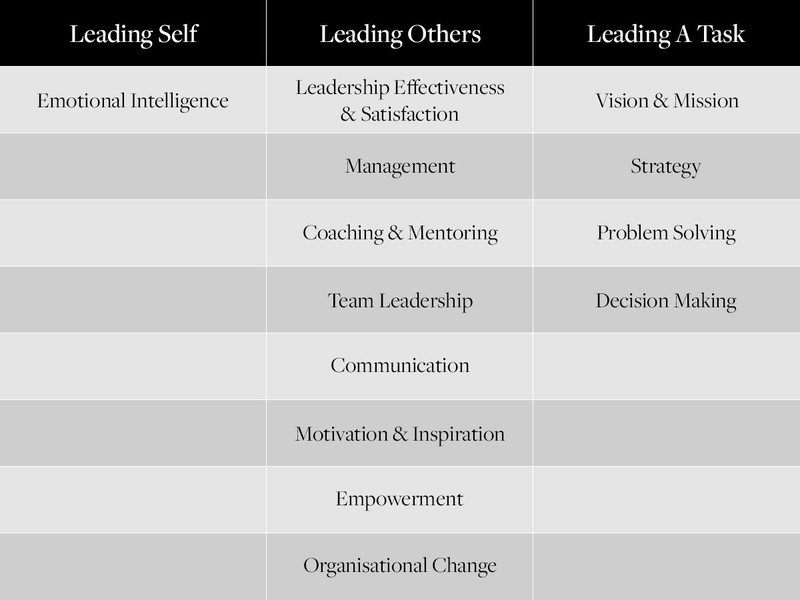

10 Ways To Be A Better Leader
Start With Self Awareness
Self-awareness, without a shadow of a doubt, is the most important skill any leader should have. There are 13 skills which comprise good leadership and most can be learnt or enhanced, but this can’t happen without self-awareness. Self-awareness is about knowing how our emotions impact our decisions and our behaviours, what triggers these emotions, and how our behaviours impact others. Without this, good leadership can’t happen, and no development will be effective.
Focus On The Core Skills
There are a total of 13 skills that constitute leadership, and it is easiest to look at them as follows:

This list demonstrates the multifaceted nature of leadership – whether you are just trying to steer yourself, a team or head up a project. However, it is easier to understand it in the reverse: you can see how if you are not proficient in these skills, how quickly things could go wrong. We often find that the conversation around leadership wants to focus on the positive outcomes of good leadership, but we should not shy away from looking at the disastrous consequences of poor leadership either.
Find Your Own Style
Leadership is the most public expression of our inner selves, hence there are a wide variety of leadership styles. At Leadership Trust, we define leadership as ‘using your personal power to win hearts and minds to achieve a common purpose’. We see leadership styles on a spectrum from leading with the heart all the way to leading from the head. There is no right or wrong – any situation might suit one style better than the other. We do however talk about ‘duopoly of leadership’ where the combination of two individuals will provide the best outcome. If you think of all the very successful leaders, they all come partnered with their opposite. Think Richard Branson and Don Cruickshank – Branson would not be where he is today without someone applying order and structure.
Take On A Mentor Or Coach
Mentoring and coaching are two different things, but they are essential if you want to accelerate, and sometimes even enable, your own leadership development journey. In broad strokes, their role is to ‘hold the space’ for the individual to think and come up with answers; to hold the mirror up, i.e. allow the individual to see the difference in between what they think they are doing and what is actually happening; and provide what we call ‘critical friendship’, i.e. allowing the individual to see the unwanted truth. We can theoretically achieve all this on our own, but it takes a lot longer if it ever happens – it is hard to see our own blind spots. Finding a good mentor or career coach will expedite the process.
Be Clear On Your Values & Vision
Knowing how to stay calm in a crisis or know how to balance risk-taking with the need for stability are all skills that will distinguish a great leader from a good leader and from a poor one. Leadership is possibly the only differentiator between success and failure in these contexts. In my view, ego and fear are the two most important elements to explore to find the right balance and understand what motivates your decisions. Your values and the vision should be the true north of every decision you take – so it never pays to lose sight of either. When things get difficult, emotions run high and perhaps the temptation to cut corners appears. When you feel that urge, go back to your values, which will provide the impartial answers you’re not necessarily able to make rationally in those circumstances.
Avoid Demotivation
Motivation is a key element in successful leadership. People often ask us how they should motivate others, but it is more important to ensure we do not demotivate as opposed to actively motivate. If adults are given a purpose, and freedom within constraints, they do not need to be externally motivated. The danger comes from interference and impediment to performance. This is a real stumbling block. The type of questions to ask yourself in these situations are: is my team clear on what needs to be achieved? Do they believe and buy in to the purpose? Do they have everything they need to be able to deliver? Are they being sufficiently acknowledged, appreciated and rewarded? Do they need anything to get to where they need to get to? The answers to those questions will tell you whether you are doing what’s needed to get the best out of them.
Prioritise Diversity In Your Team
Leadership is all about creating high-quality relationships, which enable us to welcome everyone other as they are, without judgement. Leaders have to receive feedback, allow difficult conversations and make the necessary changes to unlock the treasures that diverse, equal and inclusive workplaces have to offer. I shouldn’t have to explain the benefits of diverse environments: a 360° view of the world will strengthen the team, which can benefit from multiple sets of skills that might be missing if you were working within only one demographic. My recommendation, if you wish to develop your organisation, is to support individuals with personal development. Many DE&I programmes fail because the individuals who take part are not emotionally able to engage in the changes required, therefore providing them with that personal development alongside specific DE&I training will increase the chances of success.
Don’t Confuse Leadership With Heroism
Confusing a leader and a hero is one of the major mistakes I see people making. A hero is a leader in an exceptional context, but most leadership happens in normal, mundane circumstances. Good leadership is invisible. We, of course, have leaders who become famous and achieve great things, but most leaders are just themselves but in a more skilful way. Second, it’s important not to confuse a leader and someone in a decision-making role. Leadership is about using personal power to win hearts and minds to achieve a common purpose, and this can be implemented by anyone, anytime, from the receptionist to the middle manager to the CEO. You do not need to wait to become a CEO before engaging with leadership development.
Recognise That Some Things Will Never Change
Despite the rapid advancements in technology and business practices, human nature has not changed over the millennia of human existence. Whether you read Sun Tzu, the Ancient Greeks, Shakespeare or watch the current news, nothing has changed in human behaviour apart from context and gadgets. The basic needs, motivators and dynamics are the same. If anything, technological advancements and shifts in the workplace invite us even more to become very proficient in being human, in knowing how to engage with others, and most importantly to be able to engage in unpleasant and difficult emotions, with and without others. The difference between success and failure will only be made by the level of emotional proficiency of individuals.
Finally, Don’t Wait To Be Better
Engage as early as possible with personal development. Be proactive in asking for leadership development and coaching. As most technical tasks will be replaced with AI and automation, the only thing we have left is to know how to be human and how to impact how others feel. We have an alumnus from our flagship programme who has spent most of his career working on extremely complex IT projects. We had a chat through our 20 Years Later research project (a longitudinal study to see what impact our flagship programme has had over a 20-year period), and he said: “You can have the very best technology, but if you don’t know how to make a team work, you have nothing at all.” Leadership Trust’s vision is to enable positive social impact by developing great leaders. We believe that most issues in the world, at any level and in any context, can be linked to leadership issues. The by-product of this is better performance in business which results in improvements in all the components of success. The sooner you can roll up your sleeves and get stuck in, the better.
Leadership Trust specialises in leadership development and coaching programmes. For more information, visit LeadershipTrust.co
DISCLAIMER: We endeavour to always credit the correct original source of every image we use. If you think a credit may be incorrect, please contact us at info@sheerluxe.com.

